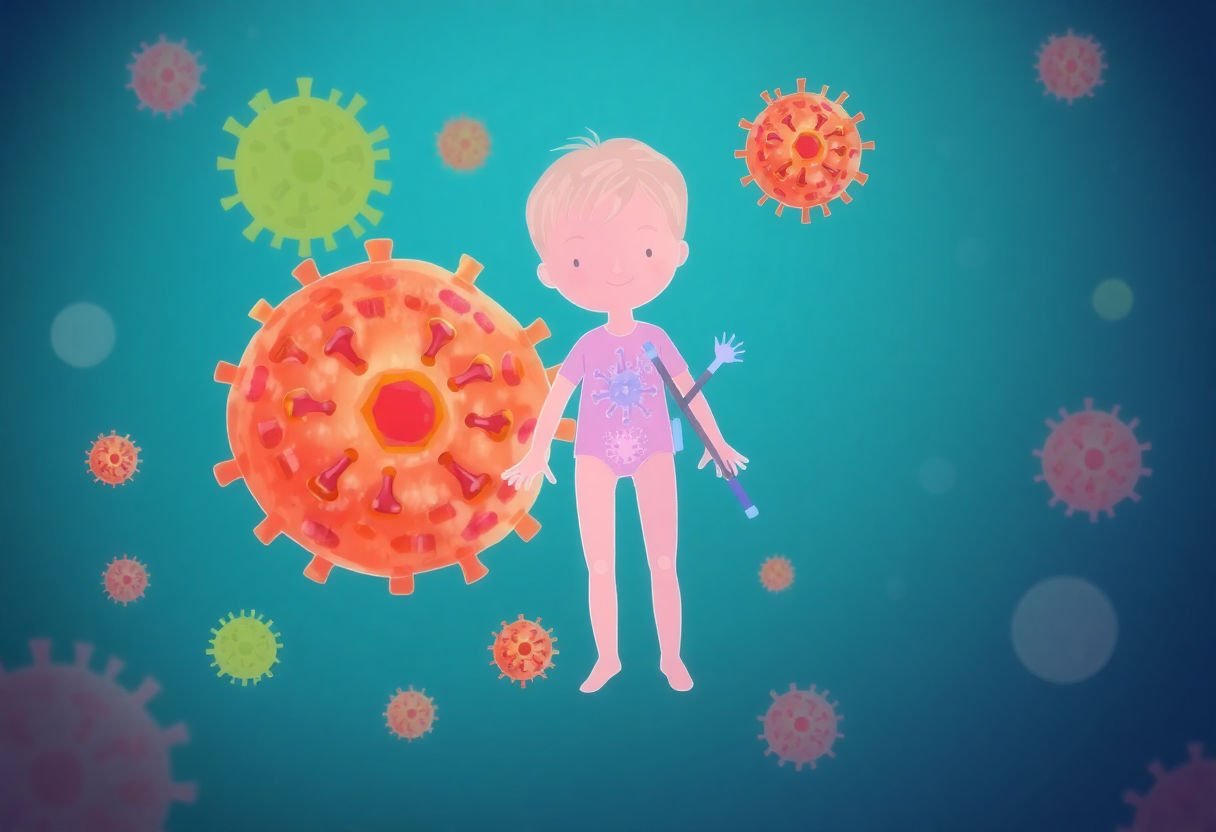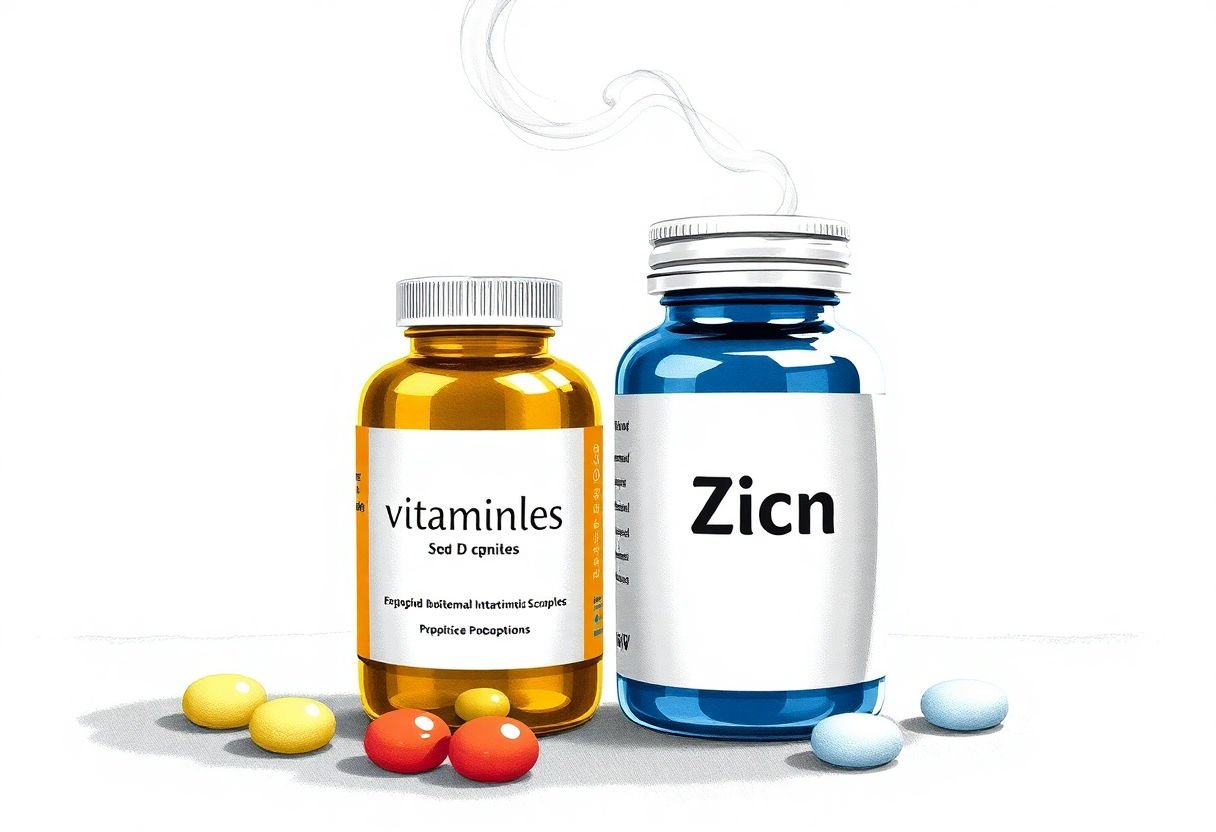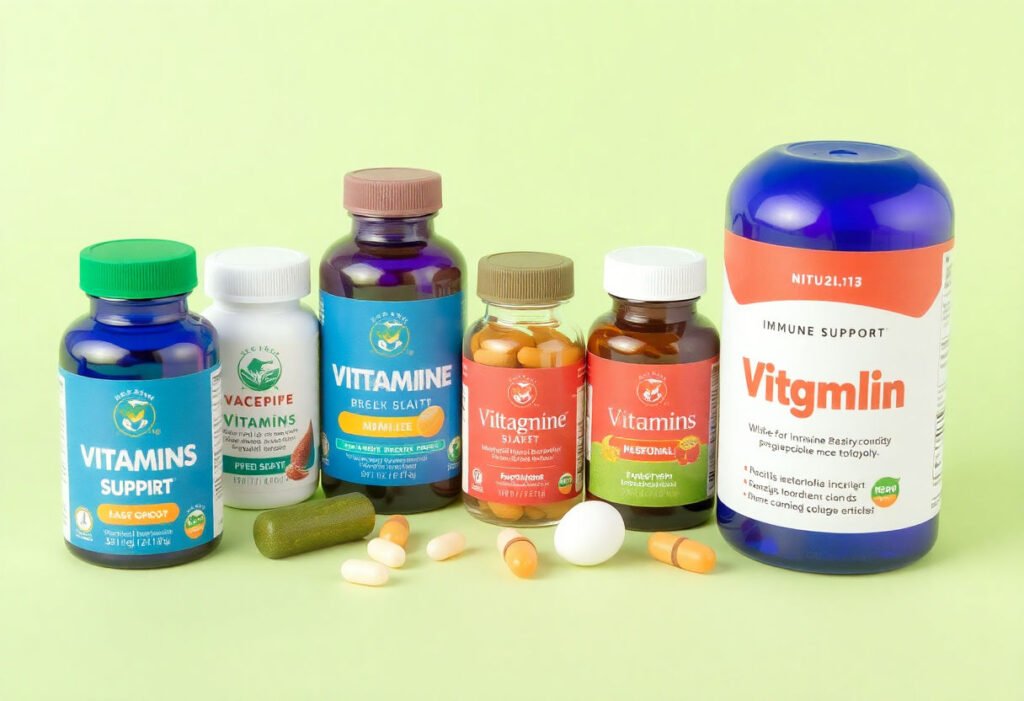Immune support vitamins are crucial for fostering a robust and resilient immune system in children, an essential aspect of their overall health and development. As children are constantly exposed to various environmental stressors and pathogens, boosting their immune defenses through proper nutrition and supplementation becomes vital. This article explores the critical role of vitamins such as C, D, and Zinc in enhancing children’s immunity, discusses safe integration of these nutrients into their diets, and highlights natural food sources. By understanding and selecting the right vitamins, parents can better support their child’s health journey, ensuring a balanced and proactive approach to well-being.
Key Takeaways
- Essential vitamins such as Vitamin C, D, and Zinc are crucial for enhancing a child’s immune system, promoting overall health.
- Ideal daily doses of each vitamin should be tailored to a child’s specific age and nutritional needs to avoid over-supplementation.
- Natural sources of these immune-supporting vitamins include a variety of fruits, vegetables, dairy products, and fortified foods.
- Consulting healthcare professionals is vital before starting any vitamin supplementation to ensure it aligns with a child’s unique health requirements.
- Misuse of vitamins can lead to potential side effects, highlighting the importance of cautious and informed integration into a child’s diet.
Understanding the Child’s Immune System

Children’s immune systems are remarkably adaptive, growing stronger and more efficient with age and exposure to various pathogens. From infancy, their immune systems are influenced by numerous factors including nutrition, genetic makeup, and environmental interactions.
Vitamins play a pivotal role in ensuring the healthy development of a child’s immune responses. During early childhood, the immune system is still learning to differentiate between harmful and non-harmful agents. This critical period demands robust nutritional support, particularly through adequate intake of essential vitamins and minerals.
Several components form the backbone of a child’s immune defense:
-
Innate Immunity: Comprising physical barriers such as skin and mucous membranes, alongside a strategic army of immune cells, it offers the first line of defense against infections.
-
Adaptive Immunity: This aspect involves specialized cells called lymphocytes that ‘remember’ previous encounters with pathogens, enhancing the body’s ability to respond rapidly to future attacks.
A deficiency in essential vitamins can impair these immune functionalities. Vitamins like A, C, D, along with minerals such as Zinc, are indispensable in bolstering the immune defenses by supporting barrier integrity, promoting effective cellular responses, and enabling efficient pathogen recognition and eradication.
Understanding how these elements interact within the immune framework highlights the importance of maintaining a balanced diet. Nutritional inadequacies can lead to weakened immune responses, exposing children to recurrent infections. Hence, a well-rounded dietary approach combined with targeted vitamin supplements, under professional guidance, ensures a fortified immune system conducive to healthful growth and development.
Essential Vitamins for Children’s Immunity

Essential Vitamins for Children’s Immunity
Ensuring a robust immune system for children is pivotal, and specific vitamins play a critical role in this development. Among these, Vitamin C is renowned for its powerful ability to stimulate the production of white blood cells, which are essential for fighting infections. This vitamin also contributes to the integrity of skin barriers, offering additional protection against pathogens.
Vitamin D, often called the “sunshine vitamin,” is crucial for immune modulation. It assists in the regulation of the immune system and enhances the pathogen-fighting effects of monocytes and macrophages, the most immune cells critical for defense against infections. Given its importance, maintaining an adequate level of Vitamin D is essential, especially in regions with limited sunlight.
Zinc is another fundamental nutrient that supports immune function. It is involved in cellular metabolism, promoting the development of healthy cells and supporting both innate and adaptive immune responses. For children, adequate Zinc intake is vital to combat infections and maintain robust immunity.
These vitamins not only aid in bolstering the immune system but also contribute to overall health. Parents should be mindful of their child’s vitamin intake, whether through diet or supplements, to ensure their immune system is equipped to handle potential health challenges. Providing a balanced diet rich in these vitamins can significantly enhance their immune function and overall well-being.
Vitamin A: An Antioxidant Powerhouse

Vitamin A, often celebrated as an antioxidant powerhouse, plays a pivotal role in supporting your child’s immune health. This essential nutrient is not just crucial for maintaining a robust immune system but also aids in promoting healthy vision and skin integrity.
Understanding its impact on immunity, Vitamin A enhances the body’s ability to combat infections. It supports the health of mucous membranes, such as those in the respiratory tract, which serve as the body’s first line of defense against pathogens. This nutrient also assists in the production and function of white blood cells, integral components of the immune system.
When considering the multiple benefits of Vitamin A, it is essential to recognize the balance required for its effective use. While it is vital for cell growth and differentiation, excess intake can be harmful, leading to vitamin A toxicity. Therefore, parents should aim for an appropriate dietary intake that meets but does not exceed daily recommended levels.
Incorporating Vitamin A-rich foods into your child’s diet is an effective way to ensure they receive this vital nutrient. Sources include:
- Carrots and sweet potatoes
- Spinach and kale
- Liver and fish oils
- Milk and eggs
Through a well-rounded diet, children can naturally obtain adequate Vitamin A, allowing their immune systems to develop and function effectively. It is always recommended to consult with healthcare professionals before adding supplements to ensure the correct dosage suited to individual health needs.
Safely Integrating Vitamin Supplements into Your Child’s Diet

Integrating vitamin supplements into your child’s diet should be approached with caution and care to ensure their safety and effectiveness. First and foremost, it is crucial to evaluate whether supplementation is necessary. Vitamins obtained from natural food sources are often more beneficial due to the presence of additional nutrients that work synergistically to boost immunity.
When considering supplements, dosage is key. Exceeding the recommended daily allowance (RDA) can lead to adverse effects such as toxicity or organ stress. Always adhere to the specific dosage instructions provided by healthcare professionals. Typically, children have different vitamin requirements than adults, necessitating age-appropriate formulations.
To seamlessly incorporate supplements:
- Choose formulations designed for children: Kids’ vitamins are often chewable or liquid, making them easier to consume and reducing the risk of choking.
- Establish a routine: Consistency helps form a habit, so pair vitamin intake with daily activities, such as breakfast.
- Educate about potential allergens: Be informed about any ingredients that could cause allergies or adverse reactions, especially in supplements not derived from standard food groups.
To minimize risks, ensure that the introduction of any new supplement is gradual. Monitor your child for any unexpected side effects, such as digestive disturbances or changes in behavior, which can indicate intolerance or an improper dosage.
Finally, communication with a pediatrician is essential to customize vitamin intake according to your child’s health needs. This proactive approach helps ensure that supplementation supports health without unnecessary risks.
Recognizing Natural Sources of Immune-Boosting Vitamins

Recognizing natural sources of immune-boosting vitamins is essential for maintaining your child’s health. A balanced diet rich in whole foods ensures they receive the necessary nutrients to support a robust immune system. Here’s a closer look at some key natural sources of vitamins that boost immunity:
-
Fruits and Vegetables: These are rich in essential vitamins and minerals. Citrus fruits like oranges, lemons, and grapefruits are excellent sources of Vitamin C, known for its role in enhancing immune function. Leafy greens such as spinach and kale offer a wealth of Vitamin A and iron, crucial for maintaining bodily defenses.
-
Dairy Products: Milk, cheese, and yogurt are not only good sources of calcium for bone health but also provide Vitamin D. Fortified dairy products can be an excellent way to ensure sufficient intake of this vital vitamin, especially important in supporting the immune response.
-
Nuts and Seeds: These are packed with nutrients like Vitamin E and zinc. Almonds, sunflower seeds, and pumpkin seeds can be easily incorporated into a child’s diet as snacks or added to meals. They provide antioxidants and essential fatty acids that help strengthen the immune system.
-
Whole Grains: Oats, barley, and whole wheat are rich in fiber and B vitamins. They aid in digestion and contribute to the overall health of your child’s immune system.
By prioritizing these nutrient-dense foods, you can offer your child natural, effective nutrition that supports their immune system, leading to overall better health outcomes. Remember, these foods not only provide vitamins but also a host of other nutrients that work synergistically to maintain a strong and resilient body.
Possible Risks and Considerations
When considering vitamin supplements for children, parents must be aware of the potential risks and necessary precautions. Over-supplementation is a common concern, as excessive intake of certain vitamins can lead to adverse effects. For instance, too much Vitamin A may result in headaches and liver damage, while excess Vitamin D can lead to hypercalcemia, characterized by an accumulation of calcium in the blood, potentially causing nausea or kidney problems.
Furthermore, children’s tolerances can vary significantly. What is a safe dose for one child might not be suitable for another, making it crucial to tailor vitamin intake to the individual’s needs. This variability underscores the importance of personalized assessment by a healthcare provider.
Allergic reactions are another risk to consider. Some children may experience allergies to specific vitamin ingredients or additives included in the supplement formulation, such as flavorings or coloring agents. Watch for signs of allergic reactions, such as skin rashes, itching, or respiratory issues.
To mitigate these risks, always check product labels for recommended dosages and avoid offering multiple supplements containing overlapping nutrients. Implementing these precautions can minimize the chances of negative outcomes and ensure that supplements effectively support children’s health. Parents should remain vigilant and informed about the supplements they choose, taking into account both the benefits and potential drawbacks of their use.
Consulting Health Professionals Before Starting Supplements
Before introducing any vitamin supplements into your child’s diet, consulting healthcare professionals is paramount. These experts possess the knowledge to evaluate the unique nutritional needs of your child, accounting for factors such as age, weight, dietary restrictions, and existing health conditions. By doing so, you can ensure that the chosen vitamins complement their health plan without causing adverse effects.
Consulting a pediatrician or a nutritionist can provide you with a tailored vitamin regimen, crafted specifically for your child’s individual requirements. This personalized guidance helps in avoiding common pitfalls such as excessive dosing, potential allergies, and interactions with other medications. A healthcare provider’s insight also encourages optimal vitamin absorption, allowing for maximum health benefits.
Moreover, regular medical check-ups and consultations act as preventive measures, enabling health professionals to monitor your child’s progress and adjust vitamin intake as necessary. This practice ensures that supplements continue to benefit rather than harm, given how rapidly children’s needs can evolve.
Furthermore, healthcare professionals can guide you through the plethora of supplement options available in the market, recommending high-quality products that have been tested for safety and efficacy. This professional advice is crucial, especially when navigating claims made by manufacturers, ensuring you make informed decisions based on evidence-backed insights rather than marketing tactics.
In sum, engaging with a qualified health professional before starting your child on vitamin supplements is an investment in their future well-being, safeguarding against possible health risks while promoting comprehensive immune support.
Conclusion
Choosing the right immune support vitamins is crucial for ensuring your child’s health and robust immune system. By focusing on essential nutrients like Vitamin C, D, and Zinc and understanding their roles through expert consultation, you can make informed decisions for safe dietary integration. Emphasizing natural food sources alongside supplements enriches your child’s nutrition. As you navigate through these important choices, remember that thoughtful attention to balanced vitamin consumption now can lead to long-term health benefits and a strengthened immune foundation for your child’s future.
Frequently Asked Questions
What are the most important immune support vitamins for children?
The most important vitamins for supporting a child’s immune health include Vitamin C, Vitamin D, and Zinc. These nutrients are vital for reducing the risk of infections and maintaining a balanced immune response.
How can I safely introduce vitamin supplements to my child’s diet?
To safely introduce vitamin supplements, it’s crucial to consult a healthcare provider to tailor the dosage according to your child’s specific needs and prevent potential over-supplementation.
Are there risks associated with giving my child too many vitamins?
Yes, excessive vitamin intake can lead to toxicity and adverse effects, such as digestive issues and liver problems. It’s important to adhere to recommended dietary allowances.
What natural foods are rich in immune-boosting vitamins for children?
Natural foods rich in immune-boosting vitamins include fruits like oranges and strawberries, vegetables like spinach and broccoli, and dairy products, which provide essential nutrients in a natural form.
Should I consult a pediatrician before starting vitamin supplementation?
Consulting a pediatrician is advisable to ensure the vitamin regimen meets your child’s unique health requirements and complements their nutritional intake effectively.


